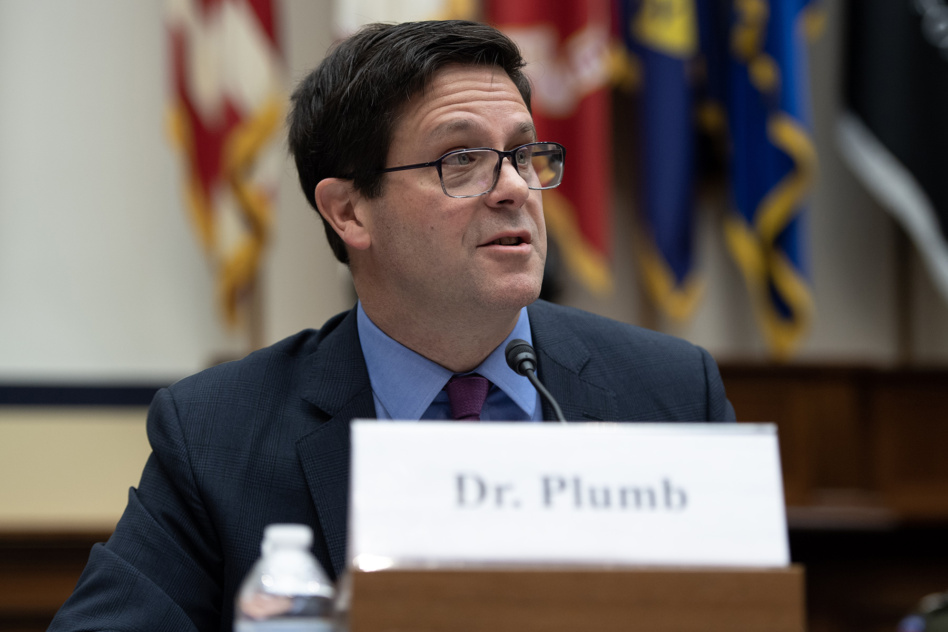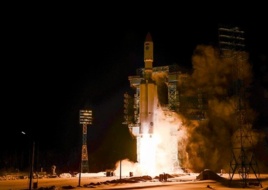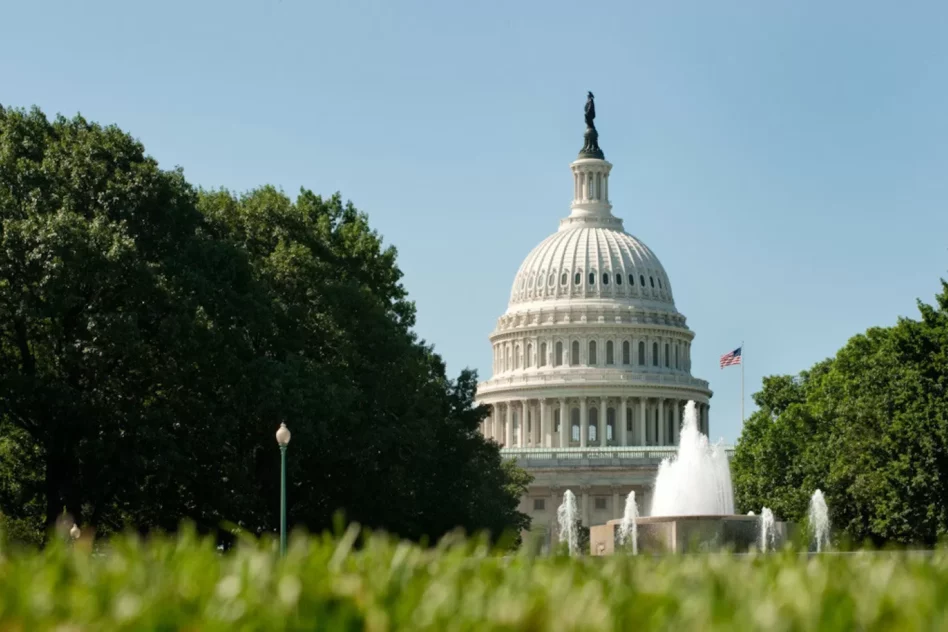As the Pentagon’s space policy chief John Plumb prepares to leave office, his departing message is simple: don’t destroy space.
Space is integral to life on Earth, from the mundane, such as GPS or weather reports, to the awe-inspiring, such as exploring other planets or conducting life-saving microgravity research. As conflict becomes a reality of the once-peaceful domain, Plumb said it’s critical for officials globally to set norms of behavior that ensure space remains usable and debris-free even during and after battles.
“How do we move to a world where folks think that, if there comes a time to use some form of military force in a space situation as it relates to a conflict, the norms and understanding of behavior are such that it does not destroy the entire environment?” Plumb told Payload. “You can have precise effects. I think that is a thing that we should all be able to agree on.”
Plumb, who has served as the assistant secretary for space policy since March 2022, acknowledged it will be hard work, but pointed to other domains as evidence that it’s possible.
“I think militaries can coexist in the space domain with commercial craft and civil craft, just like they do with air, land, and sea,” he said. “We just need to get that normalization done. That is possibly a life’s work, but that’s really important.”
Plumb also spoke about his greatest achievements at the Pentagon and the biggest to-dos for his successor in an interview ahead of his departure from the Defense Department this month.
This transcript has been edited for length and clarity.
You oversaw the drafting of two pretty significant policy documents: the space classification policy, and the commercial space strategy. What are the next steps for those as you leave office?
I’m quite proud of the work my team and really the whole building has put into those.
On space classification, the document itself is classified and the topics it covers are classified, but roughly there are a number of things in SAP [Special Access Program] channels that probably no longer need to be. That doesn’t mean everything, but there are some things. The goal is to bring some of those things down to the top secret, or potentially secret level, not unclassified.
From a pure bureaucracy standpoint, these things take time. What we’ve tried to set up here is a process to make sure we can move forward on that. The classification policy that we rewrote does not in and of itself lower the classification of anything, it just allows for it. So the military services are the ones that have to champion lowering classifications.
Obviously, reducing a classification of a thing is no simple task. It has to be done correctly and accurately. But it also has to get done, and we also have to move as expeditiously as we can. I think we have agreement across the board, from leadership and also all portions of the space enterprise that this is a valuable thing that we need to move forward on. We have to make sure we keep pressure on to make sure it happens.
On the commercial space integration strategy, I’m really proud of that as well. Once again, it’ll be implementation and sustained pressure by senior leadership to push and make sure we’re doing it.
I think we’re going to need to find a few pilot cases, as my own personal belief, that really show you could save money or time by buying this as a commercial product, as opposed to developing it ourselves. So let’s do that, and then use that money and that time we save to focus on something else that’s not available commercially. I think there’s a big opportunity here.
What are you most proud of in the two years you’ve spent in this job?
I have my four C’s: space control, space cooperation, space classification, and commercial space strategy. All of those lines of effort really I’ve just been hammering on since I got here, and I think they really paid off. We’ve made a lot of progress, moving the department and really the nation in the right direction to advance our ability to use space.
On space control, bringing along the entire national security space enterprise to examine what is the security environment in space? What does the United States need to be doing to make sure we can continue to support our joint force and to protect and defend our joint force? It was really a Herculean task. It resulted in us recommending some changes and ways ahead to the president and the president agreeing and responding in something we call the space strategic guidance, agreeing that yes, there are things that the department needs to be doing and tasking us to go and do those things. Just a tremendous effort.
The thing that I’m most proud of overall for all these lines of effort is bringing everyone along together. It turns out, that is a really effective way to work the bureaucracy. It takes perhaps a little more time. But if everyone is in from the ground up, then agreement at the top is much easier.
On space cooperation, the thing I’m most proud of there is the efforts of that Combined Space Operations initiative, or CSpO. When I got here just two years ago, it was at seven—the Five Eyes nations plus France and Germany. In that short time, we’ve agreed to expand to 10. So we’ve added Italy, Japan, and Norway to that.
Then we’ve already touched on the commercial space and the classification piece. So I would say those four things—that’s a lot. I feel like we really made a lot of progress and really moved the ball forward.
What are the biggest to-dos left for your successor?
There’s plenty of work to be done on implementation on all four lines of effort and on sustaining pressure.
On the commercial piece, which is the easiest to talk about at the unclassified level, I would say deepening that cooperation, having a better understanding across the department of what is truly available in the commercial world, making sure that that information is communicated and not just kept in stovepipes. That’s a tremendous amount of work, right there.
Obviously, my successor will have their own thoughts on where to drive. What I’ve also tried to do is set up a well-functioning team and good connective tissue across the building and with the intelligence community to make sure this kind of success can keep going forward.
What do you wish was more broadly known about national security space policy?
One thing that needs to be known and understood really by any spacefaring nation is this issue of ensuring that space is a safe, secure, and stable domain.
The United States government raised at the UN our norm about not committing destructive ASAT tests. The fundamental reason for that concern, and the reason we think that that should be a global norm that nations should adhere to, is that polluting the space environment with debris is bad for all spacefaring nations. It complicates all plans, current and future, for any company and any government trying to operate in space by creating all sorts of pieces of debris that folks have to continue to dodge for decades. That is just grossly irresponsible behavior, and there is no need for it.
The piece that we need to work towards together is how can we find a way to make sure that nations are operating in space in a way that does not destroy the space environment? It’s one of the reasons the Russian nuclear counter space threat is such an egregious problem is it would do damage to potentially all of LEO.
How do we move to a world where folks think that, if there comes a time to use some form of military force in a space situation as it relates to a conflict, the norms and understanding of behavior are such that it does not destroy the entire environment? You can have precise effects. I think that is a thing that we should all be able to agree on.
Obviously nothing happens overnight, but if we’re going to continue to get all these incredible values out of space that really everybody on the planet is now getting every single day, we all need to protect that together. I think militaries can coexist in the space domain with commercial craft and civil craft, just like they do with air, land, and sea. We just need to get that normalization done. That is possibly a life’s work, but it’s really important.
Can you share what you’ll be doing next?
I don’t have any immediate plans. I do hope to stay connected to the space world. It’s the thing I enjoy working on the most, and it’s the place that I think right now, at this point in history, there’s just so much more to be done, and there’s so much possibility.





